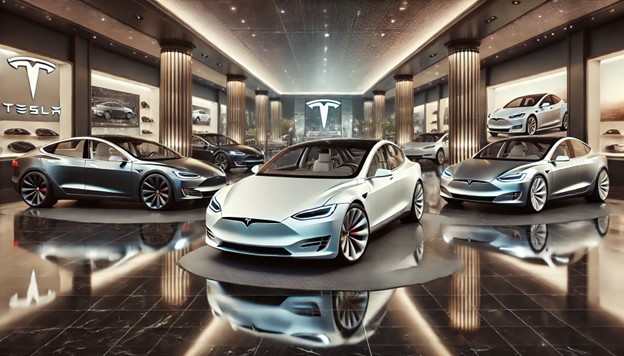Tesla Inc. (TSLA) experienced a significant drop in its stock value, falling 8% following disappointing second-quarter earnings. Despite the setbacks, CEO Elon Musk maintains an optimistic vision for the company’s future, forecasting a valuation of $5 trillion driven by advancements in autonomous vehicles.
Tesla Shares Tumble on Weak Earnings
Tesla’s latest financial report revealed that the company’s profitability took a considerable hit. The electric vehicle giant’s profits fell by 45% compared to the same quarter last year. The earnings report showed that Tesla earned 52 cents per share, missing the expected 61 cents and significantly below the 91 cents per share from the previous year.
This marked the second consecutive quarterly decline in profitability, causing concern among investors. Tesla’s net income for the quarter was $1.47 billion, falling short of Wall Street’s consensus estimate of $1.9 billion. Despite a 2% increase in revenue to $25.5 billion, surpassing the estimated $24.54 billion, the market reacted negatively to the overall financial performance.
Musk’s Optimistic Vision
Elon Musk, known for his ambitious and sometimes controversial statements, remains unfazed by the current financial downturn. During the earnings announcement, Musk revealed that the rollout of Tesla’s highly anticipated robotaxis will be delayed by two months, now expected in October.
Musk’s enthusiasm for Tesla’s future is evident in his bold prediction that the company’s valuation could reach $5 trillion. He envisions a “giant autonomous fleet” of robotaxis as the driving force behind this monumental growth. While this projection is not officially part of Tesla’s guidance, it underscores Musk’s confidence in the company’s long-term potential.
Market Reaction
The market’s response to Tesla’s Q2 earnings was swift and severe. The stock is poised to lose an 8% chunk of its market capitalization once regular trading resumes on Wednesday. This decline will add to the year-to-date losses, bringing Tesla’s stock down approximately 10% so far in 2024.
Investors were particularly dismayed by the lower-than-expected profits, even as revenue figures slightly exceeded estimates. The profit shortfall highlights the challenges Tesla faces in maintaining its profitability amidst increasing competition in the electric vehicle market and ongoing investments in new technologies.

Financial Metrics in Focus
Profitability remains a critical metric for Tesla and its investors. The 45% drop in profits was a stark reminder of the volatile nature of the automotive industry, especially for companies heavily invested in innovative technologies. The earnings per share (EPS) fell well below expectations, reflecting operational challenges and potentially higher costs.
Net income also missed analysts’ predictions, which is a key indicator of Tesla’s overall financial health. Although revenue growth was modestly positive, it was not enough to offset the negative impact of declining profits on investor sentiment.
Future Prospects
Despite the current financial setbacks, Tesla’s future is still brimming with potential, particularly with its advancements in autonomous driving technology. The delayed launch of the robotaxis is seen as a temporary setback rather than a fundamental issue. Musk’s vision of a vast fleet of autonomous vehicles driving a $5 trillion valuation continues to capture the imagination of both supporters and skeptics.
The market will closely watch how Tesla navigates the next few quarters, particularly in improving its profitability and delivering on its ambitious technological promises. The successful deployment of robotaxis could indeed transform the transportation industry and significantly enhance Tesla’s market position.
Conclusion
Tesla’s recent earnings report has highlighted the challenges and opportunities the company faces in the dynamic electric vehicle market. While the 8% drop in stock value and 45% decline in profits are concerning, Elon Musk’s bold vision for the future keeps the narrative around Tesla intriguing. As the company works through its current financial hurdles, its potential to revolutionize the transportation industry with autonomous vehicles remains a key point of interest for investors and industry watchers alike.












